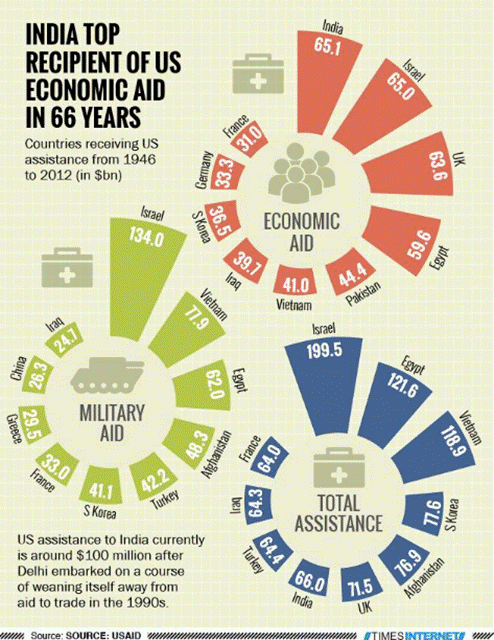History of India-US Relations
By Riaz Haq
CA
Indian Prime Minister Narendra Modi's decision to skip the upcoming Non-Aligned Summit in Venezuela sends a powerful signal of his Hindu Nationalist government's growing commitment to India's partnership with the United States.
The latest logistics deal allowing the US forces to use Indian military bases is an indication of how the Americans intend to play the India card against China after the Cold War, just as they played the China card against the Soviet Union during the Cold War.
The US-India deal is part of the US “pivot” to Asia designed to check rising China. The US Navy plans to deploy 60 percent of its surface ships in Asia in the near future. Instead of having to build facilities virtually from the ground up, as in Afghanistan and Iraq, the US has the benefit of simple arrangements for the tremendous Indian facilities, according to Forbes magazine . This deal will accelerate the unfolding post-Cold War realignment taking place in South Asia.
Massive Western Aid to India
US-India ties are not new. India has been the number one recipient of US aid since 1947, according to the US government data. The country India's first Prime Minister turned to for help during the 1962 China-India war was also the United States.

India has received $65.1 billion in US aid since its independence, making it the top recipient of American economic assistance. Pakistan, with its $44.4 billion, is at number 5 on the list. US data also shows that Pakistan is not among top 10 for military or total economic and military aid.

More recently, the US aid to India has been replaced by massive US investment in the country that keeps its economy afloat. Massive Western money inflows help India , with its huge trade deficits, pay for its imports and help maintain significant foreign exchange reserves. US investment in India has jumped 500% in the past two years, according to the Wall Street Journal .
US Help in 1962 Indo-China War
Indian Prime Minister Nehru sought significant US material aid and diplomatic help as Indian troops found themselves in full retreat during the 1962 China-India war.
A former US intelligence official Bruce Riedel in his book "JFK’s Forgotten Crisis: Tibet, the CIA and the Sino-Indian War" notes that President John F. Kennedy played a “decisive role” in “forestalling a Pakistani attack” on India, even as Islamabad then was fully capable of going to war with India to wrest the disputed territory of Kashmir.
India's Pakistan Obsession
The US efforts to partner with India are clearly aimed to check China's rise. However, India's actions and statements suggest that it expects to use this partnership against Pakistan .
Anticipating questions about US-Pakistan ties during his India visit, here's what Carter told the Council of Foreign Relation in Washington DC before leaving for New Delhi:
“I’m sure I’ll be asked about it in India, but I think the first thing one needs to say from an American policy point of view, these (India and Pakistan) are both respected partners and friends.”
"Pakistan is an important security partner", Carter added.
Pakistan-China Ties
While the US is courting India to check China's rise, the China-Pakistan ties have now moved well beyond “higher than Himalayas and sweeter than honey” level, as officials on both sides say. Chinese strategists openly talk of Pakistan as their nation’s only real ally. And China is investing heavily in Pakistan to build the Gwadar deep seaport as part of a much more ambitious and strategic China-Pakistan Economic Corridor (CPEC) that India is attempting to sabotage .
The result is that Pakistan is drawing closer to China, a rising superpower, while its rival India is partnering with the United States, a superpower in relative decline on the world stage.
Let me conclude with a quote from Brookings' Stephen Cohen on the India-Pakistan power equation:
“One of the most important puzzles of India-Pakistan relations is not why the smaller Pakistan feels encircled and threatened, but why the larger India does. It would seem that India, seven times more populous than Pakistan and five times its size, and which defeated Pakistan in 1971, would feel more secure. This has not been the case and Pakistan remains deeply embedded in Indian thinking. There are historical, strategic, ideological, and domestic reasons why Pakistan remains the central obsession of much of the Indian strategic community, just as India remains Pakistan’s.”
Here's a video discussion on the subject:
https://www.youtube.com/watch?v=6sfliv7KJVM
http://www.dailymotion.com/video/x45590s_pak-leaders-in-london-us-india-defense-deals-trump-vs-gop_news
Back to Pakistanlink Homepage

